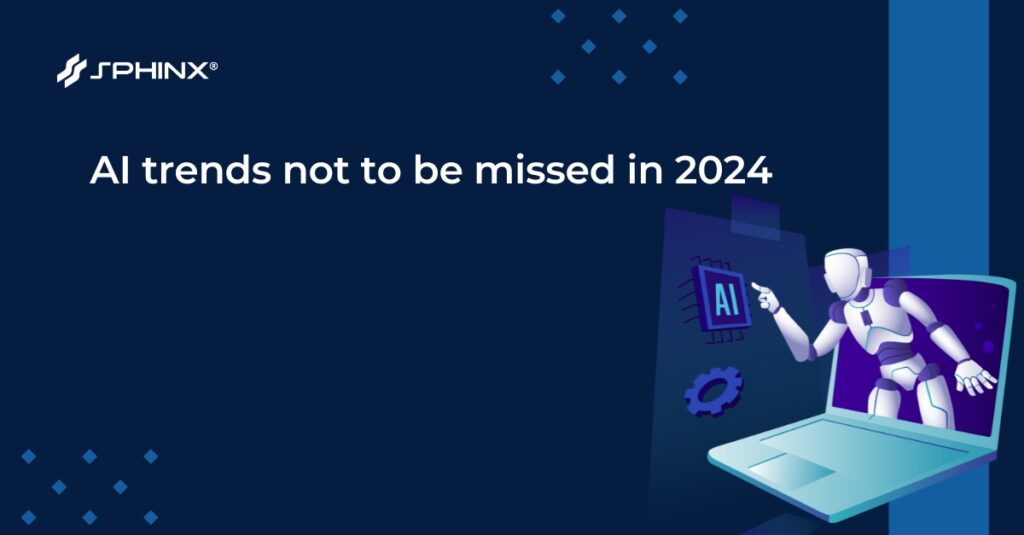In the ever-changing world of technology, artificial intelligence (AI) is becoming a highly promising and captivating field, especially in the tech industry. AI technology applications have created entirely new products and services for the current economy.
Promising AI projects are opening new doors for investors. AI technology applications have developed entirely new products and services that contribute to the growth of the AI sector. Let’s take a look at the unmissable AI trends in 2024.
1. Top 8 AI Trends in 2024
In 2024, AI is expected to continue to be a source of inspiration for many new technology projects.
1.1. Generative AI
Generative AI refers to a category of artificial intelligence algorithms that are designed to produce new content, such as text, images, music, and more, by learning patterns from existing data. Unlike traditional AI systems that operate on fixed rules, generative AI models use techniques like neural networks to understand and mimic the data they are trained on, enabling them to generate novel outputs.
For example, OpenAI’s GPT-3 (Generative Pre-trained Transformer 3) stands out as a notable instance of generative AI. It can compose essays, craft poetry, provide answers to questions, and even produce computer code by analyzing and learning from extensive text datasets. This capability to generate new content presents thrilling opportunities in numerous areas, ranging from the creative arts to scientific research, establishing generative AI as a formidable asset in today’s technological arena.
1.2. Multimodal AI
Multimodal AI refers to artificial intelligence systems that can process and integrate information from multiple types of data sources or modalities, such as text, images, audio, and video. By combining these diverse inputs, multimodal AI can provide more comprehensive and nuanced understanding and responses.
For example, a multimodal AI system in a healthcare setting could analyze patient records (text), MRI scans (images), and speech recordings (audio) to diagnose a condition more accurately than using any single data type. This capability enhances the AI’s ability to make more informed decisions, leading to better outcomes across various domains.
1.3. Personalization at scale
Personalization at scale refers to the practice of delivering highly individualized experiences to a large customer base by leveraging data, technology, and advanced analytics. It involves tailoring content, products, and services to meet the unique preferences and needs of each customer, while still managing to do so efficiently across a wide audience.
For example, streaming services like Netflix utilize personalization at scale by analyzing users’ viewing habits and preferences to recommend movies and shows that are likely to appeal to them. This approach not only enhances user satisfaction but also increases engagement and loyalty by making each customer feel valued and understood.
1.4. Workplace AI
Workplace AI, or Artificial Intelligence in the workplace, refers to the integration of intelligent systems and algorithms designed to perform tasks that typically require human intelligence. These tasks can range from simple data entry and scheduling to more complex processes such as data analysis and decision-making. Workplace AI aims to enhance productivity, efficiency, and accuracy by automating repetitive tasks, providing insights through data analytics, and even facilitating communication and collaboration.
For example, AI-powered chatbots are increasingly used in customer service departments to handle common inquiries, freeing up human employees to address more complex issues. This not only improves response times but also allows staff to focus on higher-value tasks, ultimately contributing to a more efficient and effective workplace.
1.5. AI in Education
Artificial Intelligence (AI) in education refers to the use of machine learning algorithms and data analytics to enhance and personalize the learning experience for students. AI systems can adapt to individual learning styles, provide instant feedback, and even predict future performance based on past behavior and achievements.
For example, platforms like Khan Academy use AI to offer personalized tutoring, guiding students through lessons at their own pace and offering additional practice problems tailored to their specific needs. This not only helps students grasp difficult concepts more effectively but also allows teachers to focus on providing more targeted support where it’s needed most.
1.6. Democratization
Democratization of AI refers to the process of making artificial intelligence technologies accessible to a broader audience beyond just experts and large corporations. This involves simplifying AI tools and platforms so that individuals and smaller organizations can leverage AI for their own needs and innovations.
One notable example is OpenAI’s ChatGPT, which provides an intuitive interface for natural language processing tasks. ChatGPT allows users to generate human-like text, making it useful for a range of applications such as customer service, content creation, and personal assistants. By lowering the barriers to entry and making AI tools more user-friendly, the democratization of AI aims to foster innovation, drive economic growth, and ensure that the benefits of AI are widely distributed.
1.7. Virtual AI
Virtual AI, or virtual artificial intelligence, refers to computer systems designed to simulate human intelligence and perform tasks that typically require cognitive functions such as learning, reasoning, problem-solving, and understanding natural language. These systems are often used in various applications such as virtual assistants, chatbots, and customer service automation.
For example, Apple’s Siri is a virtual AI that helps users perform tasks by understanding and processing voice commands, such as setting reminders, sending texts, or providing weather updates. Through advanced algorithms and machine learning, virtual AI can continuously improve its performance by learning from interactions and adapting to user preferences.
1.8. Ethics and regulation AI
Ethics and regulation of artificial intelligence (AI) involve the principles and frameworks designed to ensure the responsible development, deployment, and use of AI technologies. Besides, Ethics in AI refers to the moral considerations and societal impacts that guide AI development, focusing on fairness, transparency, accountability, and the avoidance of harm. Regulation, on the other hand, encompasses the legal and policy measures enacted by governments and organizations to control AI applications and mitigate risks.
For example, the European Union’s General Data Protection Regulation (GDPR) includes provisions that impact AI systems, ensuring data privacy and giving individuals rights over their personal data. These regulations help prevent misuse and promote trust in AI technologies by obliging developers to adhere to strict standards and ethical guidelines.
Final Thoughts
It’s reasonable to assert that the swift advancement of artificial intelligence has ushered us to the verge of a revolutionary period.
By fully accepting the potential of AI and using its power wisely, we can foster innovation, boost efficiency, and significantly improve the human experience. Choosing Sphinx for developing AI offers robust documentation capabilities, ensuring clarity and ease of understanding for complex projects. Its extensible framework supports seamless integration with various tools, enhancing productivity and collaboration.




CEO - Son Le
OTHER BLOGS
Blogs
10 Types of Outsourcing: How to Choose the Best One
Outsourcing has become a strategic lever for businesses seeking agility, cost efficiency, and access to specialized expertise. However, not all outsourcing models deliver the same value, and choosing the wrong approach can lead to operational friction, misaligned expectations, and limited returns. From traditional staff augmentation to fully managed services and...
Read MoreBlogs
AI Trends 2026: The Future of Enterprise Intelligence
Artificial Intelligence has moved beyond early adoption and isolated innovation. Today, AI is embedded across enterprise operations, from data analytics and customer engagement to risk management and decision support. However, as AI usage becomes widespread, many organizations are discovering that deploying AI alone does not automatically translate into strategic advantage....
Read MoreBlogs
IT Project Outsourcing for Enterprises: Strategic Best Practices
Enterprise organizations today are under constant pressure to innovate faster and modernize legacy systems, while also scaling technology capabilities without inflating operational costs. In this context, IT project outsourcing has evolved from a tactical cost-saving option into a strategic lever for long-term business growth. In this blog, we outline how...
Read MoreOTHER BLOGS
Our Sevices
IoT Development
SphinX offers cutting-edge IoT development services, seamlessly connecting devices and providing innovative solutions for a...
Xem thêmOur Sevices
Blockchain Development
We are highly proficient in engineering reliable and secure blockchain technologies from the ground up,...
Xem thêmOur Sevices
ERP & CRM Development
ERP & CRM development services that you need! Streamline business processes and enhance organizational efficiency....
Xem thêmOTHER BLOGS
Our Sevices
IoT Development
SphinX offers cutting-edge IoT development services, seamlessly connecting devices and providing innovative solutions for a...
Xem thêmOur Sevices
Blockchain Development
We are highly proficient in engineering reliable and secure blockchain technologies from the ground up,...
Xem thêmOur Sevices
ERP & CRM Development
ERP & CRM development services that you need! Streamline business processes and enhance organizational efficiency....
Xem thêm